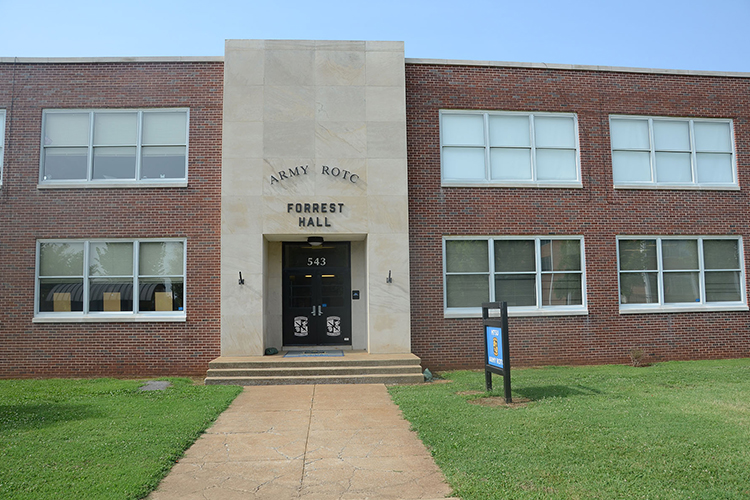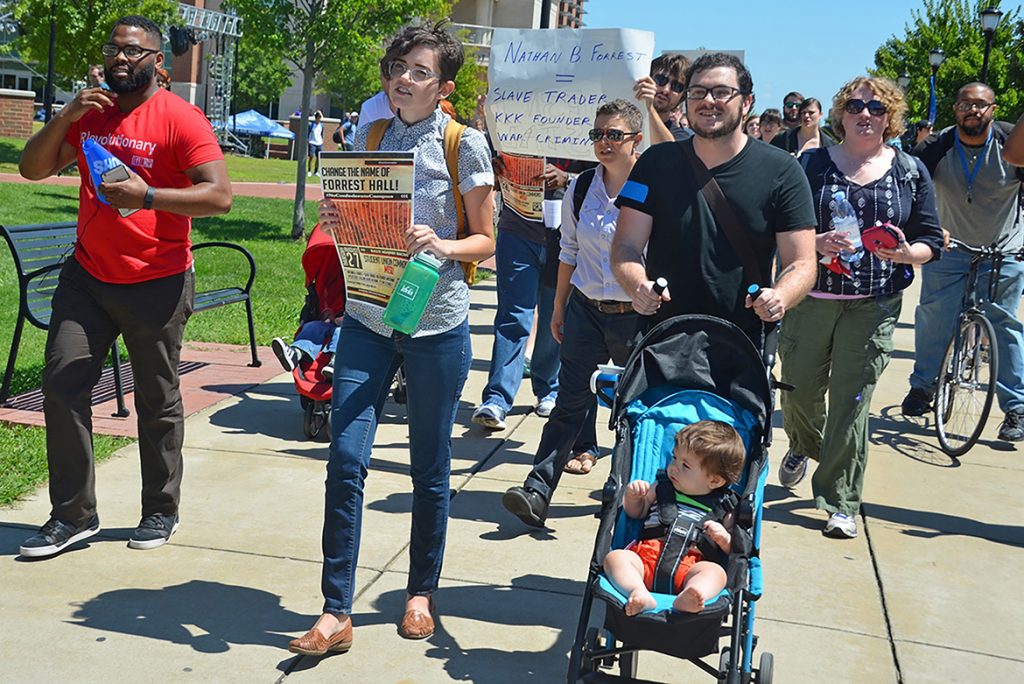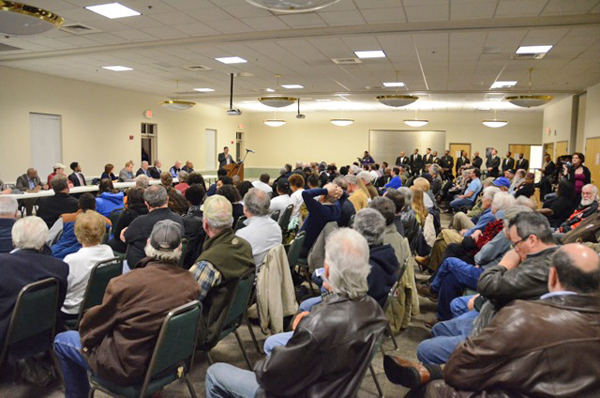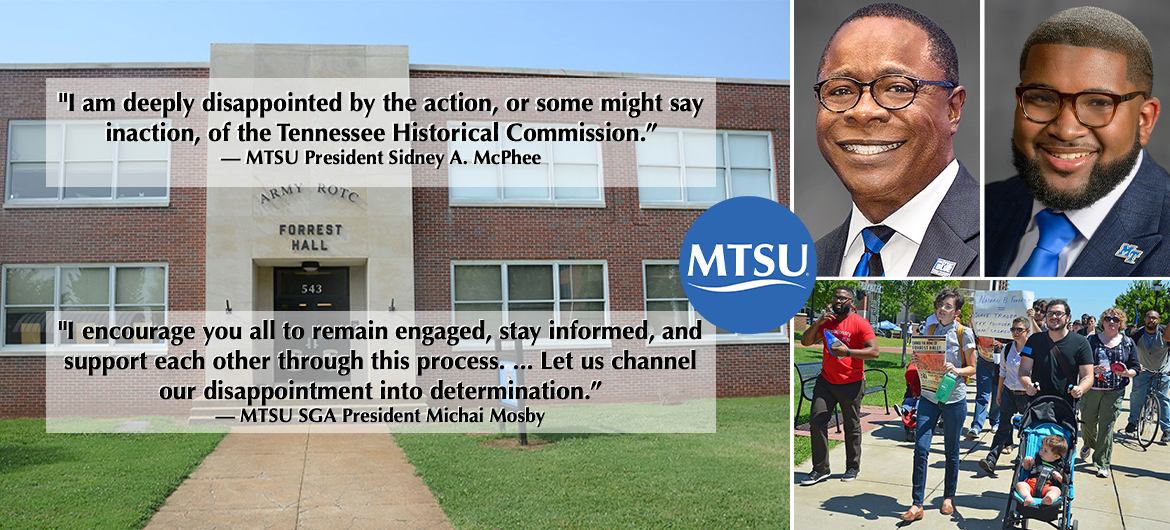MURFREESBORO, Tenn. — Middle Tennessee State University President Sidney A. McPhee and Student Government Association President Michai Mosby have issued responses to the campus community following the recent decision by the Tennessee Historical Commission to reject the university’s effort seeking a waiver that would allow to change the name of Forrest Hall, which houses the Army ROTC program and is named after Confederate Gen. Nathan Bedford Forrest.

Led by McPhee and University Counsel James Floyd, a university delegation recently presented its case for seeking the waiver over several hours during the commission’s meeting held Friday, June 21, at the William R. Snodgrass Tennessee Tower in downtown Nashville. Some students and faculty also expressed support during a brief public comment period at the end of the meeting.
On hand to object to the petition waiver were representatives of the Tennessee Division of the Sons of Confederate Veterans.
The commission’s 20 members who were present ultimately decided to deny the waiver petition on a vote of 11-6 with 3 abstentions. A unanimous vote would have been required to secure the waiver.
From President Sidney A. McPhee:
To the University community,
University Counsel James Floyd and I appeared before the Tennessee Historical Commission last Friday for a hearing to request a waiver of state law that would allow us to rename Forrest Hall. Michai Mosby, our SGA president; Louis Kyriakoudes, Albert Gore Research Center director; and Vice Provost Laurie Witherow also testified before the commission.

You may recall that in 1958, Forrest Hall was named in recognition of Nathan Bedford Forrest, a Confederate general during the Civil War who was later believed to be the first Grand Wizard of the Ku Klux Klan from 1867 to 1869. We first appeared before the commission in 2018 to seek permission to change the building’s name, but that request was denied.
We presented very compelling justification for this second request, reflecting the importance of fostering a diverse campus environment that is welcoming to all. Citing previous actions and decisions by the commission, we made a strong case that our request was consistent with state and federal law, as well as recent rulings of the commission, and was reflective of the contemporary values we hold dear as a society.
I felt that our request was deserving of the commission’s full consideration and support. Unfortunately, following a brief discussion by the commission, the waiver was denied.
I am deeply disappointed by the action, or some might say inaction, of the Tennessee Historical Commission. In failing to recognize how the naming of this building serves as a painful reminder to many in our community of a blighted period in our history, they ignored their own rationale, crafted in 2021 to justify removing Forrest’s bust from the State Capitol, stating that taking such actions “advances the compelling public interest of racial reconciliation.”
While certainly not the outcome we had hoped for, our University community stood tall and represented this institution in the finest manner. I want to thank the many faculty, staff and students who joined us in Nashville and demonstrated our shared resolve and commitment. We will continue to express our strong contention that the Forrest name is inappropriate for such display on our campus and that he is best remembered and evaluated in our classrooms and the University’s archives.
Sincerely,
Sidney A. McPhee
President
From SGA President Michai Mosby:
Fellow Students,
I am writing to you today with a heavy heart to share our collective disappointment in the Tennessee Historical Commission’s recent vote. As many of you are aware, the commission decided not to approve Middle Tennessee State University’s waiver request to remove the name of Forrest Hall from our ROTC building. This decision is disheartening and does not reflect the values of inclusion, respect, and progress that we, as a university community, strive to uphold.

Forrest Hall bears the name of Nathan Bedford Forrest, a figure whose legacy is deeply entwined with the Confederacy and the founding of an organization that has inflicted immense pain and suffering on countless individuals. The name of this building stands as a reminder of a painful past, and its continued presence on our campus contradicts the principles of equality and unity that we hold dear.
I understand and share your frustration. We have worked tirelessly, through petitions, meetings, and open forums, to advocate for this change. Our voices have been strong and clear, calling for an environment where every student feels welcome and valued. This setback is undeniably disappointing, but it should not deter us from our mission.
In moments like these, it is essential to remember the power of persistence and the importance of standing together. The road to meaningful change is often long and challenging, but it is a journey worth undertaking. Let this decision ignite a renewed commitment in each of us to fight for what is right. Our efforts are not in vain; they are steps toward a better, more inclusive future.
As your SGA President, I will continue advocating for this cause. This is not the end of our efforts but rather a call to action to intensify them. We will continue to work closely with Dr. McPhee and the University administration to advocate on your behalf, ensuring that your voices are heard and respected at every level.
I encourage you all to remain engaged, stay informed, and support each other through this process. Together, we can and will make a difference. Let us channel our disappointment into determination. Let us prove that our commitment to justice and equality cannot be overshadowed by a single decision. Our voices matter, and together, we will be heard.
True Blue!
Michai J. Mosby
SGA President, Middle Tennessee State University

Background
The latest waiver request was the second over the past several years. The first effort began in 2016 when the university was still governed by the Tennessee Board of Regents and followed the university’s announcement the year before that it would engage the community whether to rename Forrest Hall, which was erected in 1954 and named four years later.
The announcement came following a mass shooting at a historically black South Carolina church that prompted a national discussion about Confederate iconography on public property, with the Forrest Hall name being a source of controversy on campus for decades, resulting in periodic protests and public denouncements led by some students.
Now governed by the MTSU Board of Trustees, the university filed the latest waiver petition in 2023, with trustees and the SGA publicly pledging support for seeking the waiver, which was sought in the aftermath of the national and global protests following the death of George Floyd a few years earlier and followed the historical commission’s 2021 decision to remove a Forrest bust from the State Capitol in the wake of ongoing public outcry.
More information is available at https://mtsu.edu/forresthall.




COMMENTS ARE OFF THIS POST